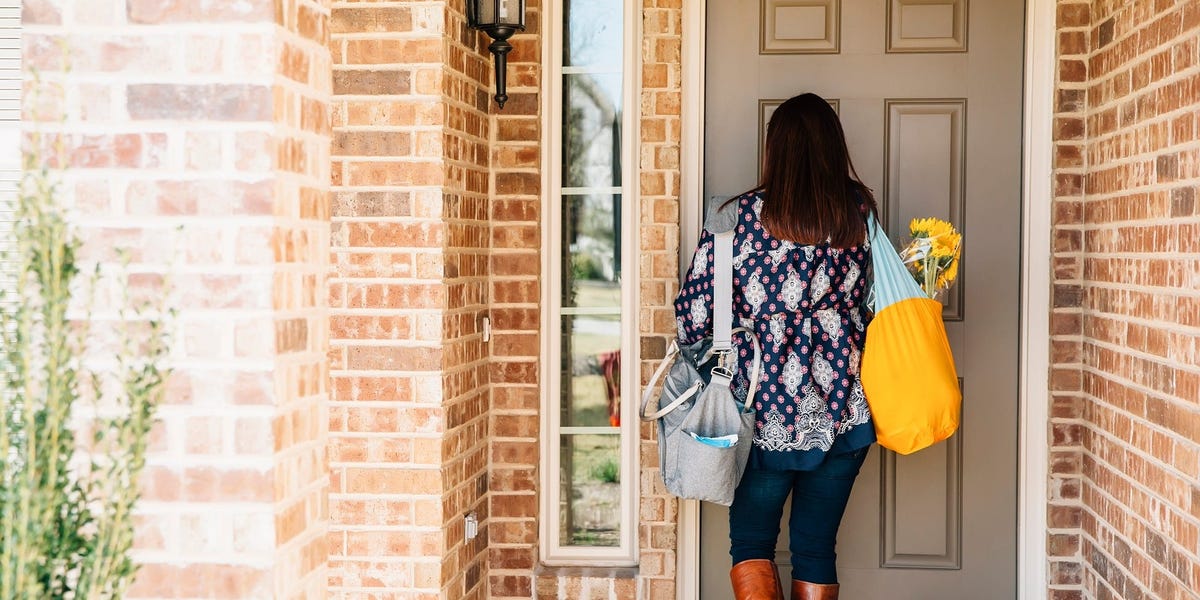
[ad_1]
Our experts answer readers’ home-buying questions and write unbiased product reviews (here’s how we assess mortgages). In some cases, we receive a commission from our partners; however, our opinions are our own.
- In 2021 the average refinance closing costs in the US were $2,375 without taxes, according to data from financial tech company ClosingCorp.
- According to the Federal Reserve, typical closing costs are about 3% to 6% of your mortgage’s principal.
- Your refinancing costs will vary based on where you live, the value of your home, and your new and old lender’s requirements.
If rates have gone down since you first got your mortgage, refinancing your home can help save money on your monthly mortgage payment. It can lower your interest rate, or stretch your mortgage over several more years.
But the refinancing process can be expensive. Refinancing essentially replaces your old mortgage with a new one, and that typically means paying closing costs all over again.
How much does it cost to refinance?
When you refinance, you may pay a little less in closing costs than what you paid on your original loan. According to data from ClosingCorp, average closing costs on a mortgage refinance were $2,375 in 2021, excluding any recordation or other specialty taxes. ClosingCorp didn’t disclose the national average refinance closing costs with taxes for 2021.
By contrast, the average home purchase closing costs without taxes were $3,860 in 2021. This means that borrowers who are refinancing pay a little less for their mortgages than those who are purchasing a new home.
See Insider’s top picks for the best mortgage refinance lenders>>
Average closing costs by state
One of the big factors that will influence the price you’ll pay on your home’s refinance is where you live. Your home’s location will have a big impact on the closing costs, since your closing costs involve taxes and your home’s value.
According to data from ClosingCorp, the state you live in will change how much you pay at closing. These were the average closing costs with taxes in each state in 2021.
Closing costs are higher in some states than in others. In New York, for example, where both property values and taxes are high, average refinance closing costs are over $10,000. In Missouri, however, where both property taxes and values are relatively low, average closing costs are $1,405.
Typical refinance closing costs
Refinancing closing costs aren’t just one fee — there are several expenses that make up closing costs. Much of the money you pay at closing covers your mortgage lender’s fees and any services that were used in the process of underwriting and closing on your loan. Some of your costs may also go to taxes.
Here’s a list of some of the fees you can expect to see in your refinance process, along with estimates of of what each will cost according to data from the Federal Reserve.
Taxes:
You may owe property taxes when you close on your refinance. Costs vary based on where you live, and your home’s value. According to Bank of America, six months of property taxes are generally due at closing.
Application fee:
Applying for another mortgage will cost you. This fee typically isn’t refundable.
Loan origination fee:
- Cost range: Up to 1.5% of the loan’s principal
Not all lenders charge this fee, but some do. It could be a costly addition to your closing costs — a $200,000 mortgage balance with a 1.5% origination fee would add $3,000 to your closing costs.
Appraisal fee:
- Cost range: $300 to $700, if needed
If your home hasn’t been appraised recently, you may need to pay for an appraisal. This process involves a licensed appraiser, who will assess your home and determine its fair market value.
Title search and insurance:
Lenders search for your home’s title to make sure you’re the owner, and check for any liens you have on the home. If there’s a mistake on the title that would jeopardize their investment, the title insurance provides protection to the lender.
Survey fee:
- Cost range: $150 to $400, if needed.
If your home hasn’t had a survey recently, your lender could require one. This essentially verifies that your home and all of its structures are where the title says they are.
Attorney review and closing fee:
- Cost range: $500 to $1,000
The company or lawyer that conducted your home’s closing will need to be paid for their work, and this will become part of your closing expenses.
Prepayment penalty:
- Cost range: One to six months’ interest payments, if applicable.
Some lenders charge prepayment penalties on loans paid off before expected. Since a mortgage refinance will essentially pay off your old loan before your expected payoff date, your old lender could charge a prepayment penalty.
Not all loans have a prepayment penalty. Ask your lender if your current mortgage has a prepayment penalty, and if so, how much it is.
How to spend less on refinancing
There are ways to reduce the cost of refinancing your home, including:
Negotiate
While there are some costs your lender probably can’t budge on, such as appraisal fees, others might be open to negotiation. These include application and origination fees.
Ask your refinance lender if there is any leeway on these costs.
Shop around
For certain closing costs, such as your title search fee, you’re allowed to choose your service providers rather than going with the default ones the lender chooses. The services you’re allowed to shop for will be listed on your loan estimate — the Consumer Financial Protection Bureau has an example on its website.
No-closing-cost refinance
It’s also possible to refinance without paying closing costs up front. Instead, you’ll pay for the costs over the life of the loan.
Lenders make up for the closing costs in two ways, according to the Consumer Financial Protection Bureau. Some lenders will charge higher interest rates for borrowers who opt for loans without closing costs. Other lenders will add the closing costs to the loan’s principal, increasing the total amount you owe, and the total amount you’ll pay interest on.
While closing costs might seem high, it’s generally cheaper to pay them up front, even if you’re paying them a second time around while refinancing.
[ad_2]
Source link






